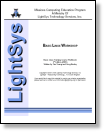Overview: Basic Linux Workshop
 The Basic Linux Workshop, our first workshop in the LightSys Missions Computing Education Program, covers everything you need to get started using this powerful, flexible, and cost-effective operating system as a server platform in your ministry. Our hope in offering this workshop is that you would be effectively trained to be able to appropriately use the Linux system to help the goals of your mission or ministry.
The Basic Linux Workshop, our first workshop in the LightSys Missions Computing Education Program, covers everything you need to get started using this powerful, flexible, and cost-effective operating system as a server platform in your ministry. Our hope in offering this workshop is that you would be effectively trained to be able to appropriately use the Linux system to help the goals of your mission or ministry.
This workshop includes a 200+ page course workbook, presentations and demonstrations of the material, and a dozen hands-on exercises to let you gain experience.
Basic Linux Workshop Contents
Below is a brief list of the topics covered.
- Section A: Basics: Linux installation, getting around / basic navigation, basic system administration, and basic networking.
- Section B: Service configuration: DHCP, DNS, File and Print services with Samba, Email services, and Apache (web server).
- Section C: Security: Backup and recovery, basic security practices, and a security tools overview.
- Section D: Intermediate topics: Regular expressions and tools, the Linux GUI, and networking tools.
Q & A...
| 1. | How long does the workshop take? We can offer this workshop in as little as three days, given eight full hours of class/lab time each day. However, in that configuration we cannot offer Section D or any other custom sessions, and the workshop will feel very "rushed". Our recommendation is that you give a full week for this workshop and plan on six hours of class/lab time each day. |
| 2. | What Linux distribution do you use? Traditionally, we have focused on the Red Hat / Fedora / CentOS series of Linux distributions, mainly because they are so common and because there are a lot of related distributions available as well. We try to provide the most up-to-date material that we can in any particular workshop, and we will specifically update our materials and lab exercises before conducting a workshop. |
| 3. | Does a certification accompany completion of this workshop? We do not currently offer certification. If you think that certification would be of value, please do let us know, as we are considering offering it in the future. |
| 4. | How much does the workshop cost? We do not charge tuition for our workshops. Depending on what venue the workshop is offered in, there may be venue fees for room, board, and materials. If we offer the workshop for your organization at your site, our standard method of ministry applies. |
| 5. | Do you offer the workshop online? We can offer this workshop online. There are no fees for this service. Please contact us for more information. Where possible, however, we do recommend face-to-face instruction instead of online learning. |
| 6. | Are the materials available for me to download? The workshop materials are available via the LightSys Associates Network (LAN). |
| 7. | What is the minimum / maximum class size? We have used our workshop materials in the context of a one-on-one consulting situation, as well as in larger (15 to 30) participant classroom-style environments. Maximum class size depends on the venue, and if we hold the course at your facility, that is entirely at your discretion. For classes larger than 10 participants, we recommend that you have on hand at least one person with a reasonably good knowledge of the topics to be covered, for each 10 class participants in excess of 10. For smaller classes, we can conduct the workshop in the context of consulting with you regarding the specific technologies you are using or will use. |
| 8. | What facilities do you require to conduct the workshop? One lab computer (or, virtual machine) per participant is required. You will need a computer (or virtual machine) whose hard drive can be completely overwritten. Doing the hands-on exercises in a dual-boot scenario is possible but not recommended unless great care is taken, due to the nature of the hands-on exercises. Connectivity of the workshop LAN to the internet is also important. Separation of this LAN from your normal computer network is important since part of the workshop involves configuring DHCP services. |




